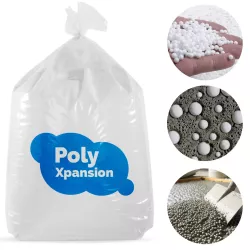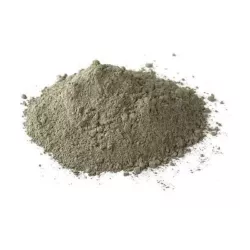Menu
Polystyrene Beads and Additives for Lightweight Concrete
New Polystyrene Beads and EPS Additives for Lightweight Concrete
Explore our selection of new polystyrene beads and EPS additives dedicated to creating lightweight concrete and lightweight screeds. These high-quality expanded polystyrene (EPS) products allow you to create insulating and lightweight mixtures with densities ranging from 250 to 1200 kg/m³, by partially replacing traditional aggregates. The EPS additive ensures perfect homogeneity, preventing the clumps of beads for a stable distribution.
Main Applications
Ideal for floor renovation, thermal and acoustic insulation (conductivity up to 0.09 W/m°C, sound reduction 25-40 dB), roof terraces, timber framing or pipe coating.
Advantages and Features
Made in France, these non-combustible (M0 classified) and non-rotting materials are easy to apply by pumping or projection, with a mechanical resistance of 0.8 to 12 MPa.
Ordering Options
Order for your professional or personal projects, and benefit from technical advice based on our product sheets.

NOTICE: Lightweight EPS Concrete - Technical Sheet
The information contained in this document is given for information only and corresponds to our current knowledge. They do not in any way commit our responsibility in case of non-compliant or inappropriate use of our products. Given the many possibilities of use, our recommendations do not exempt users from carrying out their own tests. Our laboratory and technical service will provide you with the information you want and are at your entire disposal.
Properties
Process
Made from hydraulic binders, polystyrene beads, possibly sand and EPS ADDITIVE, EPS CONCRETE allows to achieve lightweight and insulating concretes. With its great flexibility of use, a wide range of lightweight concretes can be achieved by varying the respective quantities of the components (see table).
Constituents
- Cements that can be used: CEM I 52.5, CEM II 32.5 and 42.5. The choice of cement, at equal dosage, will be determined by the desired mechanical strength.
- Polystyrene beads: grain size = 3mm, density = 15 to 20 kg/m³.
- Sand: use a clean 0/5 sand. Take into account its moisture content to determine the mixing water.
- EPS ADDITIVE: special additive for the production of lightweight concretes. It prevents segregation and ensures a homogeneous and stable distribution of polystyrene beads.
Advantages
- Lightweight: density from 300 kg/m³ to 1200 kg/m³.
- Insulating.
- Non-flammable (cement dosage >350kg).
- Noise reduction from 25 to 40 dBa.
- Water resistance.
- Won't rot.
- Pumpable: maintains its homogeneity, no segregation.
- Thixotropic: can be applied on sloping surfaces.
- Easy to apply: mixer, pumping, etc.
- Resistance to punching/shear.
Areas of Application
- Renovation and insulation of floors.
- Floating or adhesive screed.
- Roof – terraces.
- Half-timbering.
- Filling mortar.
- Facade insulation (projection) - E.T.I.
- Prefabrication (non-supporting elements).
- Sound insulation.
- Pipe casing.
- Light road surfaces.
- Mortar for assembling insulating blocks.
Implementation
Nature of Supports
Floors, Everite plates, concrete, masonry, steel tray, NERGALTEC, floor joists, solid ground, particle boards (CTBH).
State of Supports
Clean, sound, dust-free, moistened for concrete, masonry, floor joists.
Preparation
Thoroughly moisten the mixer or the concrete mixer and empty the water. Put the necessary amount of water. Add the cement and the amount of EPS ADDITIVE, continue mixing. Gradually add the beads. Add the sand. Continue mixing until a homogeneous and pasty mixture is obtained. EPS CONCRETE should not be liquid and should not be remoistened.
Preparation in RMC: The binding phase cement + sand + water + EPS ADDITIVE will be prepared in the mixer and then poured into the mixer truck, mixing at high speed for 10 minutes.
Application
Pour the mix and spread it out with a ruler, leveling it with a large float. Do not vibrate. Application thickness: minimum 5 cm. No upper limit. When spraying: 2 to 4 cm per pass in 2 passes spaced 24 hours apart. Application temperature: 5 to 35°C. Drying: cover with polyane for 4 to 5 days + 2 days in the air.
Specific Points
- Separate the posts and pipes.
- Discontinuous wooden floor reinforcements welded mesh 100 x 100 x 3 mm.
- Continuous wooden floor reinforcements welded mesh 50 x 50 (220g/m²).
- Respect the expansion, partitioning, threshold, level break joints in accordance with DTU 26-2.
- Before its final coating, protect EPS CONCRETE from intense traffic.
- For an adhering screed, the thicknesses can be reduced by half.
Finishes
After 7 days (14 days in winter) implement a P3 plaster. P2 premises (residential use): 3 mm thick. P3 premises (office use): 10 mm thick.
Associated Coatings
- Glued tiling: drying 7 days (14 days in winter) + P3 plaster.
- Floating parquet: direct installation after 15 days of drying.
- Glued parquet: drying 15 days + P3 plaster.
- Carpet - plasticized soft floor: drying 7 days (14 days in winter) + P3 plaster.
Consider the specifications of the smoothing plaster before the final installation of the coating. On flexible support (floors, steel tray, NERGALTEC) use flexible adhesives and grouts for the installation of the tiles.
Plasters: for facade insulation, respect the application instructions of the plasters (see the specifications of the ETI: External Thermal Insulation).
Safety
Safe. In case of projection rinse with water.
Storage
Keep away from moisture.

 Beads made in France
Beads made in France




